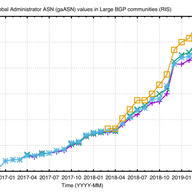
BGP Large Communities Uptake - An Update
• 4 min read
We were asked by the community to look at the uptake of BGP Large Communities as observed by our Routing Information Service (RIS).

Based in Amsterdam, NL
Articles
Likes on articles

I'm a data scientist at the RIPE NCC. I'm a chemist by training, but have been working since 1998 on Internet related things, as a sysadmin, security consultant, web developer and researcher. I am interested in technology changes (like IPv6 deployment), Internet measurement, data analysis, data visualisation, sustainability and security. I'd like to bring research and operations closer together, ie. do research that is operationally relevant. When I'm not working I like to make music (electric guitar, bass and drums), do sports (swimming, (inline) skating, bouldering, soccer), and try to be a good parent.

• 4 min read
We were asked by the community to look at the uptake of BGP Large Communities as observed by our Routing Information Service (RIS).
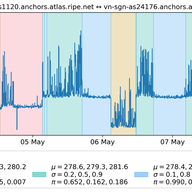
• 3 min read
Humans are pretty good at finding patterns in network measurements, but it can be difficult to automate this so one can process many time series at the same time. Now we have an expert in the house who can help us with this.
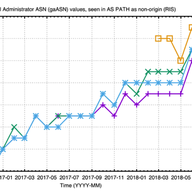
• 9 min read
In this article we look into the uptake of BGP Large Communities using the RIPE Routing Information Service (RIS).
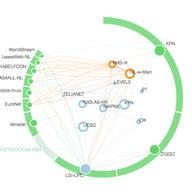
• 5 min read
We're looking at user-to-user connections, based on RIPE Atlas measurements and ISP's end-user market share estimates provided by the APNIC.
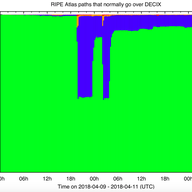
• 6 min read
On the night of 9 April 2018, DE-CIX Frankfurt experienced an outage. As this is one of the largest Internet Exchange Points, this is an interesting case to study in more depth to see what we can learn about Internet robustness. We plan to update this article if new information/corrections flow in.
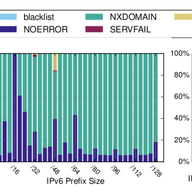
• 6 min read
Last week I attended the Passive and Active Measurement (PAM) conference in Berlin. In this article I present some highlights and take-aways.

• 6 min read
This year's Internet Measurement Conference (IMC) was held in London from 1 - 3 November. In this article we highlight some of the presented work that we think is interesting and that the RIPE community might find useful.
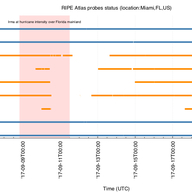
• 4 min read
There are all kinds of reasons why RIPE Atlas probes might become disconnected. So, even though we'd like all probes to be connected all the time, disconnects can also tell us a useful story.
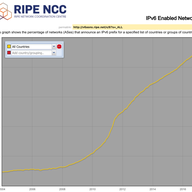
• 4 min read
We found a bug in a dataset that we've been producing for years.
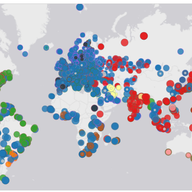
• 8 min read
The RIPE NCC is operating K-root, one of the 13 DNS root servers. In this article we shed some light on the operational policies of K-root to clarify possible misunderstandings about how it is operated.
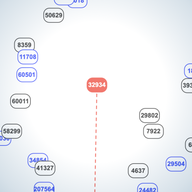
• 4 min read
Following the Facebook outage that took place on 4 October, we saw people looking to BGPlay to get a better view of what went on. Here's a look at what the RIPEstat visualisation has to show us about the event in question.
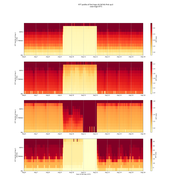
• 7 min read
RIPE Atlas probes actively measure Internet connectivity through a variety of measurement types. In this article, we take a closer look at what probes can tell us about outages.
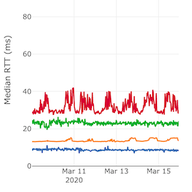
• 3 min read
As part of the Internet health hackathon, we studied RIPE Atlas delay signals before and during the COVID-19 pandemic. Here's what we found.

• 5 min read
After the recent earthquake in Croatia we looked at RIPE Atlas and RIS data to visualise the impact a large event like this can have on the resilience of the Internet.
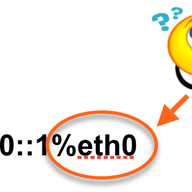
• 8 min read
...or, how RIPE Atlas measurement data just got a little bit more complex. Some people say IPv6 is "96 more bits, no magic". And while this is true for most network operators, if you're a RIPE Atlas system programmer, you can run into interesting situations. In this article, we described how link-l…
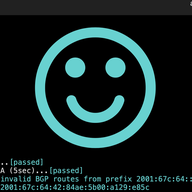
• 2 min read
How can you quickly figure out if a network you are using is dropping invalid Resource Public Key Infrastructure (RPKI) BGP announcements? You can do so by opening up a browser and visiting our RPKI test web page.

• 8 min read
When withdrawing an IP prefix from the Internet, an origin network sends BGP withdraw messages, which are expected to propagate to all BGP routers that hold an entry for that IP prefix in their routing table. Yet network operators occasionally report issues where routers maintain routes to IP prefi…
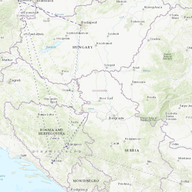
• 3 min read
Based on RIPE Atlas measurements, we can illustrate if paths between different networks in a given country stay in that country. We can also provide sketches of interconnections between networks in that country. In this article we look at the situation in Bosnia and Herzegovina.
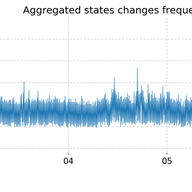
• 6 min read
This post describes the result of an internship of a month of integrating an experimental data analysis method into RIPE Atlas.
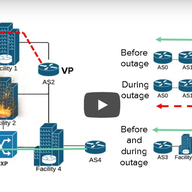
• 8 min read
Networks rely increasingly on Internet Exchange Points (IXPs) and carrier-neutral interconnection facilities that enable dense localised peering connectivity to handle the massive traffic exchange between clients and servers.
“Thank you for this, Emil and Alun! From looking at the map you provided, it would be great to see an additional anchor in Katthammarsvik. Do you think it's worth trying to add one there?”
Thanks for the suggestion. I think that depends on the physical (cables) and logical (routing) topology near Katthammarsvik in relation to the cable landing there. In a quick search I didn't find datacentres there, which makes me think it would not be too useful. Experts on the local Internet infrastructure would probably be able to answer if it would make sense or not.
This RIPE Labs article has good information on how to avoid effects from unknown attributes showing up at your BGP routers: https://labs.ripe.net/author/berislav_todorovic/bgp-path-attribute-filtering-a-powerful-tool-to-mitigate-alien-attributes/
“Hi Emile, I remember attribute 28 showing up in several previous studies. Interesting to see it causing a problem this time! As bgpdump maintainer, I'd ask you to check out v1.6.2 or higher, since 2020 there is a '-u' flag to output unknown attributes in the short (-m) mode (helpfully submitted by Italo Cunha) - it may make your future parsing life much easier :) Kind regards, Colin”
Thanks Colin, I didn't know, and this would have speeded up my analysis if I had!
Code for looking into AS Adjacency changes is available here: https://github.com/emileaben/as-neighbour-diff
Code on how to create graphs like Figure 1 ( ie. BGP view of how networks in a country interconnect ) is available here: https://github.com/InternetHealthReport/country-as-hegemony-viz
NOG Alliance is helping out network operators in Ukraine: https://nogalliance.org/our-task-forces/keep-ukraine-connected/
An effort related to keeping Urkanian servers/websites online by the Dutch Cloud Community: https://dutchcloudcommunity.nl/community/cloud4ukraine/
We got a request for the HHI scores for other countries. I've put these in a small repo on github together with the code that generated this. repo: https://github.com/emileaben/hhi-eyeballs HHI scores for 2022-03-07 are available here: https://raw.githubusercontent.com/emileaben/hhi-eyeballs/main/eyeball-hhi.2022-03-07.csv
“This is awesome work, thank you! Do you maybe have the script/notebooks/sources to reproduce this? This could be potential used for other countries.”
Hi Jenneth, The observable notebook we used for this is here: https://observablehq.com/@aguformoso/internet-outages-as-seen-by-ripe-atlas . It's a little rough around the edges, so it would be great if you could help improve it!
Thanks for your comment Maxime. I would love to see more analysis too, and the tool allows people to do this. Take for instance this thread on Twitter where Jason Livingood analyses the signals for the US: https://twitter.com/jlivingood/status/1245142990336688130 If others have analysis for specific countries they want to share it would be great to have them collected, for instance as comments to this RIPE Labs post!
Showing 18 comment(s)